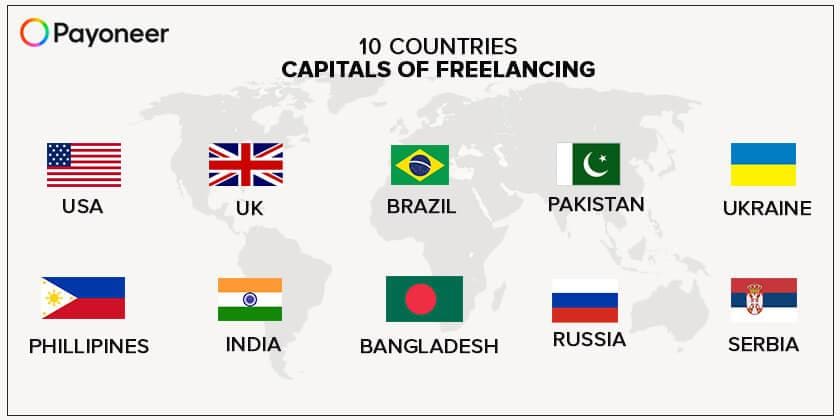Bangladesh is a highly populated country with an unemployment rate of around 4.20%. Labour Force Survey, 2022 published by the Bangladesh Bureau of Statistics (BBS) revealed that the unemployment rate among people with tertiary-level education rose to 12 percent in 2022. It refers to the fact that unemployed graduates are increasing day by day. Freelancing is a possible way out, but how to empower freelancing in Bangladesh?
In our neighbouring country, India, the forecasted revenue for the Business Process Outsourcing market is anticipated to reach US$7.12 billion by the year 2024. This projection suggests an anticipated compound annual growth rate (CAGR 2024-2028) of 9.96%, culminating in a market volume of US$10.41 billion by 2028. A BPO professional, e.g. a call center agent in India has to be paid way less than someone in the US. Therefore, the US companies prefer hiring remote workers from India with adequate skills to do the job for them. Moreover, the market in India is formalized by companies such as Tech Mahindra, Infosys etc. Bangladesh can offer equally competitive pricing in the BPO market. But that requires upskilling of the population, formalization of the industry, supported by necessary government policies.
Current Situation of Freelancing in Bangladesh
25% Increase in the Number of Freelancers
Annually from 2018 to 2022
57% Bangladeshi Freelancers
Raised their compensation
50% Bangladeshi Freelancers
Had taken up more projects
Back in the days, the concept of freelancing was not that much popular in Bangladesh. With the development in technology, the scenario has started to change. According to the Bangladesh Freelancers Development Society (BFDS), the number of registered freelancers has increased by 25% annually from 2018 to 2022. Over the years, 57% of Bangladeshi respondents raised their compensation and 50% had taken up more projects.

Ranked 8th In the 2019
Global Gig-Economy Index published by Payoneer
US$
0
M
Annual Income
0
Active Freelancers
Currently, Bangladesh is the second-largest supplier of online labour in the world. There are at least 10,50,000 active freelancers in Bangladesh according to BFDS sources. However, the actual number can be significantly more. Freelancers in Bangladesh are estimated to generate more than US $100 million annually, according to the ICT Division. A study by the Centre for Economics and Business Research (CEBR) indicates that Bangladesh is set to ascend to the 20th spot from 34th spot by 2037 and thus, will become a ‘tiger economy’.
Engagement of Bangladeshi Freelancers
In percentage
No Data Found
The freelancers of Bangladesh are engaged in different sectors. The percentage is: 60% in the creative and multimedia sector, 16% in software development, 9% in both writing and translation, 6% in sales and marketing support and 0.2% in the professional service sector.
0
%
Of the Population under 35 Years Age
The freelance workforce in Bangladesh is the youngest compared to the rest of the world, with 83% under the age of 35. Training an older age group can help in increasing the remittance of the country.
Initiatives Taken So Far
There have been various initiatives taken by different government and non-government entities to ensure welfare of the freelancers, as well as to empower them.
Learning and Earning Development Project
BDT 3.19 Billion
Budget for the project
57,683 Individuals
Intended to train by 2021
2 Million Jobs
Intended to be Created
30% Quota
For women
In 2014, the government of Bangladesh launched the “Learning and Earning Development Project” worth BDT 3.19 Billion which provided free training to 57,683 individuals by 2021. This project was implemented to create 2 million jobs in the IT sector. The project is still active in all districts of Bangladesh and working to make youths digitally educated. The project also has a 30% quota for women. The possession of a laptop, Secondary School Certificate (SSC) degree, and a basic knowledge of computers is necessary to sign up for the project.
She Power Project
Women Freelancers to Entrepreneurs
Female IT Service Providers
Women as Call Centre Agents
10,500 Women
Trained for the ICT Sector
18-40 Years
Age Eligibility
BDT 20,000 per Trainee
To buy laptop
The government also introduced the “She Power Project” to engage female entrepreneurs in the Information and Communication Technology (ICT) sector. This project was approved in 2018. Right after the initiation, the project included 10500 women in the ICT sector through training. This project trains women to build them in three categories – Women Freelancers to Entrepreneurs, Female IT service providers and Women as Call Centre Agents. To avail the assistance of this project the women must be local residents, have at least elementary knowledge of ICT, must be between 18 to 40 years of age and be fluent in the English language. The training programs are divided into three levels, and upon completion of all the three levels, participants receive certificates and a sum of Tk. 20,000 as capital to buy themselves a laptop.
Freelancer ID Card
0
Freelancers According to ICT Division
In November, 2020, the ‘Freelancer ID card’ was launched by the government’s ICT Division, Startup Bangladesh and Bangladesh Freelancer Development Society (BFDS) jointly to aid 650000 professionals. BFDS handled the technical matter of this project. With the help of this project, freelancers got virtual id cards and the remittance also got tracked. Around eight thousand freelancers registered on the website just within a month of the starting of the project. With the help of this freelancer ID, a freelancer can have easy access to passports and credit cards from banks.
Even a government job with one-fifth earning potential is more dignified in the eyes of the people of Bangladesh. Freelancers required a recognition to lessen their hassles and formalize their work.

Saif Khan
Freelancer & Co-founder, Rank and Trend
In addition, the government has recently adopted a plan to recognize 0.5 million active freelancers under this project. The ICT Department and the Bangladesh Freelancer Development Society have created a database of freelancers to keep a track. The Department of Youth Development and the Department of Women’s Affairs are working relentlessly alongside the government for the progress of the current situation.
Simplified Cash Incentive by Bangladesh Bank
US $
0
Upper Limit of Cash Incentive
Bangladesh Bank has simplified the process of cash incentive against the foreign currency earnings up to $5000 in January, 2022. The Foreign Exchange Policy Department of the central bank lifted the existing requirement of having “telegraphic-transfer messages“ from the clients mentioning trade details.
The marketplace from where freelancers earn foreign currency is supposed to be recognized by the Information and Communication Technology Division.
The BB referred the freelancers’ exporting products as “software and information technology-enabled services”, which includes digital content development and management, animation (both 2D and 3D), geographic information services, IT support and software maintenance services, website services, business process outsourcing, data entry, data processing, call centre, graphics design (digital service), search engine optimization, web listing, e-commerce and online shopping, document conversion etc.
Employment Creation through Freelancing Training for Educated Job-Seeking Youth
BDT 0.47 Billion | 16 Discricts
Budget for pilot project
6400 Freelancers
To be trained by June, 2024
1900 Freelancers
Trained by 2023
64% of Trainees
Secured job as freelancers
US $ 1 Million
Outsource income generated
A project under this title, worth BDT 0.47 billion was initiated on a pilot basis across 16 districts in 2022, which targeted to train up 6400 freelancers by June, 2024. Among them, the training of 1900 people was completed by last year and 64% of them have already secured jobs. It resulted in an earning of 1 million dollars. They are now outsourcing their skills to foreign clients.
Expansion of the Project
28,800 Youth
To be trained in total by December 2026
To create more job opportunities , this project has been extended by the GoB to provide training in the remaining 48 districts. The emphasis will be on increasing female participation in freelancing. The project will be implemented from January 2024 to December 2026 by the Directorate of Youth Development with an estimated cost of BDT 2.99 billion. With the help of this project 28,800 youths will receive training in computer applications, financing, basic English, and digital marketing. According to IMED’s evaluation, around 99% of the project’s expenses will be allocated to training.
Special Banking Products for Freelancers
Earnings of freelancers is a source of foreign currency for different banks. As a result of the freelancer ID card, banks can now easily identify the freelancers and open special accounts for them to attract foreign currency. Different banks including EBL, City Bank, BRAC Bank, SIBL etc. have started offering special products for freelancers. On these special savings account, freelancers get an additional profit and can deposit a portion of their earnings in the Exporters Retention Quota (ERQ) Account, as well as obtain investment from their ERQ accounts.
Challenges to Freelancing in Bangladesh
Other than the existing social stigma around freelancing and the perceived higher value of other formalized employment that freelancers have to compete against for earning social recognition, there are a few policy issues that need to be taken care of.
Lack of Standardised Payment System
0
%
Of Freelancers Think the Payment System is Risky
A lack of standardised payment mechanisms and reliable escrow services on freelance platforms creates challenges and uncertainty for the freelancers in Bangladesh. According to a research, 38.5% of the freelancers have identified the presence of risk factors regarding the payment system. Widely recognised platforms like PayPal are still unavailable. On the other hand, Payoneer or Skill are not that much popular or convenient gateway for digital transactions. But India has access to Payoneer, PayPal, Direct Bank Transfer, Stripe and Escrow, which bolsters their progress in this sector. Due to privacy issues, freelancers cannot even accept bitcoins or crypto currency as payment.
Around 40% of my clients ask for crypto-based payment options and I cannot even provide them a PayPal account.

Saif Khan
Freelancer & Co-founder, Rank and Trend
Absence of Legal Framework
The absence of clear legal frameworks and dispute resolution mechanisms poses the risk of unprotected intellectual property rights for Bangladeshi freelancers. The Labour Act categorises workers into seven different categories: Apprentice, substitute, casual, temporary, probationer, permanent, and seasonal worker. But gig-workers do not fall under any of them. There are no set body of rules governing the gig economy. There are too many ambiguities in this sector as well. Strengthening legal protections for freelancers is now a dire need.
Inadequate Facilities in Remote Areas
Freelancers residing in remote or under served areas still cannot avail high speed internet service and reliable power supply in many cases. Wi-fi connectivity in villages is very rare, whereas mobile data and devices got costlier, barring the rural population’s access to these facilities.
Increased use of AI
0
%
Of Bangladeshi Freelancers Threatened by AI
60% freelancers of Bangladesh work in the creative sector and 9% work in the writing and translation sector. This industry could suffer due to breakthroughs in the AI spectrum. Image-generating programs like DALL-E, Midjourney, texts-generating programs like ChatGPT have already demonstrated their potential.
At the end of the day, a highly qualified freelancer in certain fields will always be in demand. AI is just a way to deliver it faster. A good freelancer can either use AI to increase efficiency or lose their clients to a more efficient freelancer who knows how to use AI properly.

Saif Khan
Freelancer & Co-founder, Rank and Trend
If AI can successfully do works like content writing, graphic designing, programming, analysis and reporting, it will create a massive loss for the freelancers in Bangladesh. Thus, freelancers should be developing their skills in areas that AI can’t take over. On the other hand, they can learn using AI to their own advantage and increase efficiency. Both of these require adaptive mentality
Recommendations
- Freelancers of Bangladesh lag behind due to language proficiency and skills. Investment in educational and skill development programs tailored to specific needs of freelancers can increase competitiveness in the global market.
- The government of Bangladesh should invest significantly in technological infrastructure. Initiatives can be taken to improve broadband accessibility and the use of hardware and software tools in both urban and rural areas. Furthermore, encouraging innovation and technological adoption among freelancers will increase convenience among them.
- Collaborations with global freelancing platforms can create increased visibility and opportunities for freelancers and lead to higher export volumes. Negotiating favourable trade agreements such as tariff barriers, cross-border payments, and legal recognition of freelance contracts can encourage active participation of the freelancers.
- The establishment of a regulatory framework is necessary to safeguard the rights and intellectual property of the freelancers. This framework must include fair payment practices, establishment of clear contractual terms, ways to address conflicts etc.
- A proper payment gateway should be established and the profession of freelancers must be recognised.
About the Author

Umme Farzana Rupa, a former debater, currently excelling as a passionate student at Bangladesh University of Professionals. Engaging communicator and dedicated learner, she continues to thrive in academics, leaving her mark on campus with her inquisitive spirit and determination.